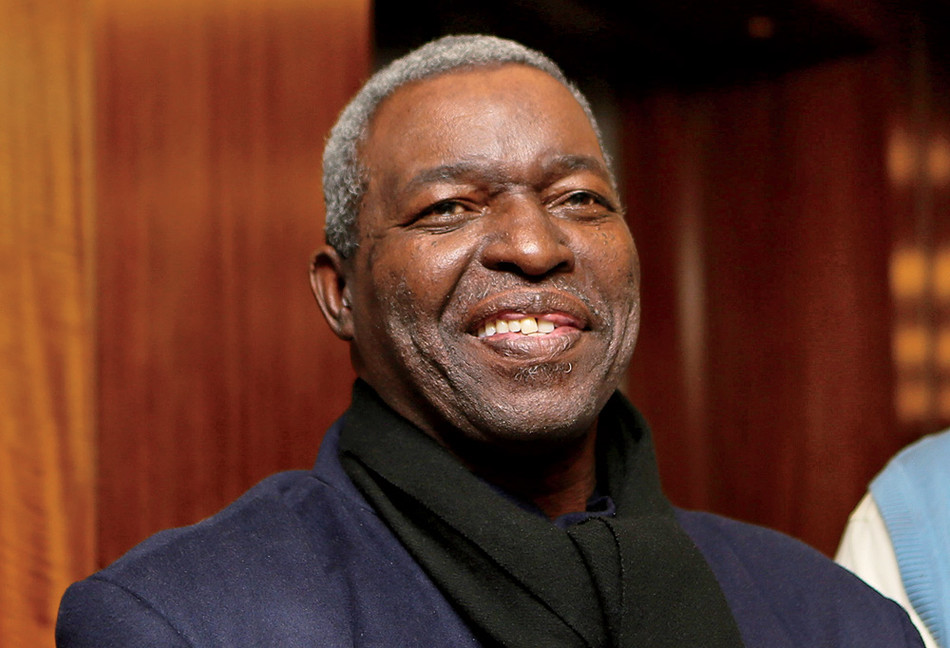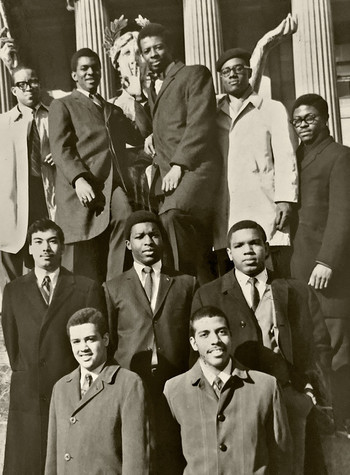This fall, the African American and African Diaspora Studies Department will announce the winner of the inaugural Zachary Cornell Husser Prize for Community Engagement and Empowerment. Department chair Farah Jasmine Griffin says the annual award, established by a committee of Columbia alumni, will go to students who embody the spirit of Zach Husser ’70CC, a.k.a. Brother Zach, who passed away in October 2018.
A big, charismatic man with an irrepressible smile, Husser arrived on campus in 1966 and immediately made his presence known. The political-science major from Wilmington, Delaware, tutored high-school kids in Harlem through Columbia’s Double Discovery Center and mentored young men from the Manhattanville Houses, a public-housing complex at West 126th Street. He played football and basketball for the Lions and cofounded the Columbia chapter of Omega Psi Phi, which at the time was the only Black fraternity on campus. During the protests of 1968, Husser, with a group of students that included the future founders of the Zach Husser Prize, occupied Hamilton Hall, calling for, among other things, the formation of a Black-studies department — much like the one that, more than fifty years later, is granting an award in his name.
Husser’s devotion to the African-American community, and Harlem in particular, sets the standard for the Zach Husser Prize. In 2019, Larry Frazier ’70CC, now an estate lawyer in Washington, DC, and Leon Denmark ’71CC, former executive director of Newark Symphony Hall, met with Griffin on behalf of the alumni committee and presented their idea. “We thought, this is where we need to do this prize, in this department,” says Frazier. “It fit perfectly with our philosophical interests.” They all agreed that the award would fund projects proposed by undergraduates involved in African-American studies and social-justice work. “I was blown away by the idea and wanted to work with them to make it happen,” Griffin says.
The committee — Frazier, Denmark, James Boggan ’71CC, Alford Dempsey, Mark Durham ’70CC, Marvin Kelly, Karla Spurlock-Evans ’71BC, and Fred White ’70CC, ’73LAW — set out to raise the funds. “It was important for us to make it a broad-based effort so that as many people as possible could feel a part of it,” says Frazier.
Husser’s ties to Columbia and Harlem were enduring, and in the last months of his life he spent a lot of time traveling from his home in Hackensack to Upper Manhattan. There were fiftieth-anniversary events for the ’68 campus uprising and for the creation of Blackfrica Promotions — the Harlem cultural organization responsible for Harlem Week — with which Husser had been active since 1974. And on October 18, 2018, Husser sat at a table in Low Rotunda dressed in a tuxedo that his wife, Joan Wiltshire-Husser, had made for him, and watched his friend Heyward Dotson ’70CC, ’76LAW, a Rhodes scholar and college basketball star, be inducted into the Columbia University Athletics Hall of Fame. The ceremony meant everything to Husser, who had persuaded the reserved Dotson to accept the honor.
“Zach was so happy for Heyward,” Wiltshire-Husser says. “You’d have thought he was getting the award. He could not contain himself; he was all around the room.” That weekend, Husser attended a Columbia football reunion and went to the football game at the Baker Athletics Complex. The following week, he fell ill at home and died a few days later. He was seventy years old.
No one could believe it. Brother Zach was too good, too present — a loving husband, father, and grandfather, he advocated tirelessly for education (he was a mentor to students at the Eagle Academy for Young Men, a college preparatory school in the Bronx, and a staff member at the Eagle Academy Foundation) and housing (he spent his career as an administrator with the New York City Housing Authority) and was forever firing off impassioned calls to action to his vast social network (“Dear Family,” they’d begin). He brimmed with strong opinions (“He didn’t mind sharing them with anyone who was listening — or not listening,” says Frazier), and could get a party started just by stepping into a room.
“Zach’s values were all the right values,” says Jonathan Schiller ’69CC, ’73LAW, chair emeritus of the Columbia University Board of Trustees. “The Zachary Husser Prize is really to be given to someone of great character.”
“He was our heart, our energy,” says Frances Sadler ’72BC, who worked with Husser to bring reunions for Black alumni of Columbia and Barnard, long held elsewhere, back to Morningside Heights — a project that Husser started in 2015 and enthusiastically promoted. “People would do anything for Zach, because he saw them. Everyone loved Zach.”
Frazier and the others were determined to memorialize that spirit.
“With this prize,” says Frazier, “Zach’s name will live in perpetuity.”
To support the Zachary Husser Prize for Community Engagement and Empowerment, visit the Columbia University online giving form, enter "Zachary Husser" in the fund search bar, and select your donation amount.




